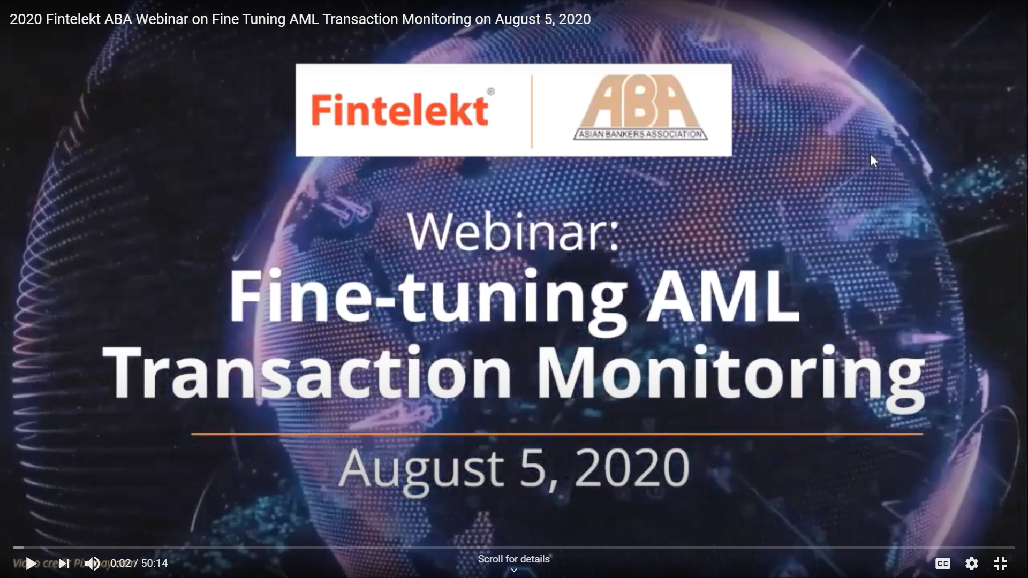With more than 900 participants from 45 countries, the webinar on “Fine-tuning AML Transaction Monitoring” held on 5 August 2020 proved to be the most well-attended to date among the webinars on AML/CFT jointly held by the Asian Bankers Association (ABA) and Fintelekt Advisory Services, Ltd.
The record-breaking session provided the specialized banking audience the opportunity to gain insights from the following industry experts:
- Douglas Wolfson, Director, Financial Crime Compliance – Asia, LexisNexis Risk Solutions.
- Asyraf Rifaei Assrangkhuun, Group Head – AML/CFT Transactions Monitoring and Investigation Operations, AmBank Malaysia, while…
- Mr. Shirish Pathak, Managing Director, Fintelekt Advisory Services served as the moderator.
The hour-long webinar was divided into two parts, each featuring the guest speaker. Both experts elaborated on the operational issues and situations affecting anti-money laundering transaction monitoring on banking system.
The presentation PDF can be downloaded HERE, the complete webinar video can be viewed below,.and the summary of the webinar is presented below.
First part – Douglas Wolfson
“Companies that are using more technology – are less worried about the job satisfaction of their staff. Their staff is happier because their job is more efficient, the workflow is more efficient, their ability to do more meaningful work is greater.“
Douglas Wolfson, Director, Financial Crime Compliance – Asia, LexisNexis Risk Solutions
Douglas Wolfson shared the findings of LexisNexis Risk Solution’s True Cost of Compliance 2019 survey which was conducted for the Asia Pacific financial services market.
The survey reports pointed out that while adding compliance staff is considered to be a logical solution, it is not a long-term solution. Adding manpower without investing in other areas to improve the efficiency of AML operations, such as technology, processes, etc. drives up the costs, hides inefficiencies in processes and creates employee and client dissatisfaction.
The results suggest that more is being spent on technology than on manpower (compared with the results of the survey in 2016). Greater use of technology is correlated with better job satisfaction. Higher AML compliance spend has been correlated with an improvement in the bottom-line by bringing in more efficiency.
The organisation’s approach to improve AML transaction monitoring efficiency should start with an enterprise-wide risk assessment and a risk-based approach based on the identified risks. There should also be a comprehensive technology assessment. Once risks are identified, constant analysis and improvement in data and models to ensure a reduction in false positives and to capture all true positives.
Transaction monitoring should increasingly move from mere thresholds-based monitoring to incorporating behaviour patterns of customers.
Second Part – Asyraf Rifaei Assrangkhuun
“When it comes to studying historical trends, organisations tend to only look for what has gone wrong. but they should also be able to look into what has gone right. That will help an organisation assess where to deploy its resources, or where to put their investment and allow them to curb spending on unnecessary areas from a technology or people perspective.”
Asyraf Rifaei Assrangkhuun, Group Head – AML/CFT Transactions Monitoring and Investigation Operations, AmBank Malaysia
Asyraf spoke about current AML compliance challenges including regulatory changes, inadequate staff training, increasing complexity of fraud and cybercrime, speed in the change of technology developments and the challenges in dynamically assessing the risks for each customer.
To make AML transaction monitoring more effective, organisations can look at audit findings for identification of operational and compliance risks. Historical trends can help identify the organisation’s strengths and help direct future investments. Risk assessments can help incorporate new and emerging risks within the industry.
The key opportunity areas for organisations include building human capital, process re-engineering and leveraging technology developments to bring more efficiency into AML transaction monitoring.


Leave a Reply